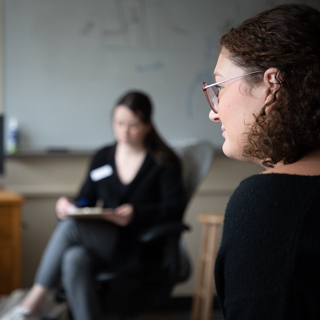BSW Distance: Frequently Asked Questions
We've compiled a list of frequently asked questions about the 2+2 BSW Distance Learning program. If you'd like further clarification or have a question(s) not listed here, please contact Hiedi Holzer, our Academic Advisor, at heidi.holzer@mso.umt.edu.
FAQ
- Research on online learning shows that students persist with blended approaches. We encourage students to attend live meetings with their instructors and meetings when we travel to your community, which happens one to two times a school year. Traveling dates and times will be shared beforehand so that students may accommodate their schedule to attend. We expect students to set aside time and make an effort to meet and engage with faculty/staff.
- You can receive your Griz Card the same day by attending the in-person orientation or another campus visit. Please refer to Get Your Griz Card for more information.
- There is information on our orientation page where you can explore minors, other licensure, and certificates to pursue (e.g., Licensed Addiction Counselor).
- Recommended. Most students transfer in with an AA. However, you can still apply/transfer into the program with a minimum of 60-75 credits while completing and obtaining your AA. We want students set up for success, which means the AA degree must be awarded by Fall of the second year and this plan must be approved by our Academic Advisor and the BSW Admissions team.
- If you're struggling in your courses or need help connecting to resources, you are expected to reach out to your Student Support, Tomas Hernandez, or instructor.
- Please visit UMOnline for Strategies for Preparing for the Unexpected and Tips for Online Student Success.
- Maximum credit – Please get in touch with Heidi
- Consortium credit – Please get in touch with Heidi
- Financial Aid Holds – Please visit the Financial Aid webpage or contact 406-243-5373 for help or additional information.
- Native American tuition waivers are part of the application process that starts with your home college and can be assisted with through our Admissions Office.
- Course content is ASYNCHRONOUS (self-directed) and shares core-curriculum, assignments and competencies with campus courses, designed to fit an online format. Online courses are web-based and use our current learning management system, Moodle. Our 16-week courses are split into smaller learning modules that require students to actively engage in learning – typically about 8-10 hours per week per course. The online curriculum allows students more flexibility as to when they complete the learning modules; however, standards are comparable to the Campus program, and significant work is required each week. Although the course is ASYNCHRONOUS, students can attend live meetings with their instructors and live events. Students will be expected to participate in online face-to-face meetings with other students, faculty, and staff with given notice beforehand. Examples of this are Orientation, Practicum Overview and Orientation.
- Instructors collaborate with the UM Bookstore to provide a list of course materials and textbooks required for your courses. These resources are available in various formats, including hard copies and e-books. For more information or to explore rental and other options, please visit the UM Bookstore or research the listed materials.
- Two years. The required social work courses to complete the program are offered in sequence. Therefore, the time cannot be shortened.
- However, it can be extended. Students that want or need to finish their practicum in a third year will work with their Academic Advisor to develop an extended 3 year program.
- Before applying to the program, you need a minimum of 60-75 credits.
- The Field Education team will provide information about the practicum application process in late Fall. They will also organize an orientation and practicum fair in the following Spring to assist you with the application and ensure that you are familiar with the process and expectations of the practicum. Your practicum will take place during your second academic year.
- Some students, for various reasons, choose a 3-year pathway, which our Academic Advisor helps design for their specific needs.
- Please visit the Curry Health Center webpage or contact 406-243-2122 for help or additional information.
- Moodle Resources: Please visit Quick Tips for using Moodle for more information.
- Panopto Resources: To learn how to use Panopto with Moodle, UMOnline has a self-paced online tutorial on using Panopto.
- Zoom Resources: Please visit Quick Tips for using Zoom for more information.
- UM Email: UMConnect is the official means of communication between students, faculty, and staff at the University of Montana. To log into your UMConnect account, you will use the same NetID and password that you use to access Cyberbear. If you prefer to forward this email to your personal account, please watch How to Forward Your UMConnect Email.
- UM Box: Please visit Quick Tips for using UM Box for more information.
- Microsoft Office 365: Please visit Microsoft Office 365 for Students.
- APA Resources
- Students awarded a BSW degree are eligible to apply for BSW Candidacy post-graduation. The process and principles of licensure are embedded in our core curriculum and in presentation prior to graduation with the National Association of Social Workers, and the Montana Board of Behavioral Health.
- Students admitted and enrolled in the 2+2 BSW Distance program residency status must be Distance In-State. Please visit the Office of the Registrar if you need to submit a Change of Status Form.
- No, your course options are limited at UM based on your residency status (distance or campus). However, we are gradually developing hybrid (blended) electives to encourage interaction and collaboration between distance and campus students. If you want to enroll in on-campus classes during the summer, you can change your residency temporarily. However, please note that you must return to your original residency status for the following semester.
- No, although you are always welcome to attend events that are offered. And encouraged to attend graduation!
